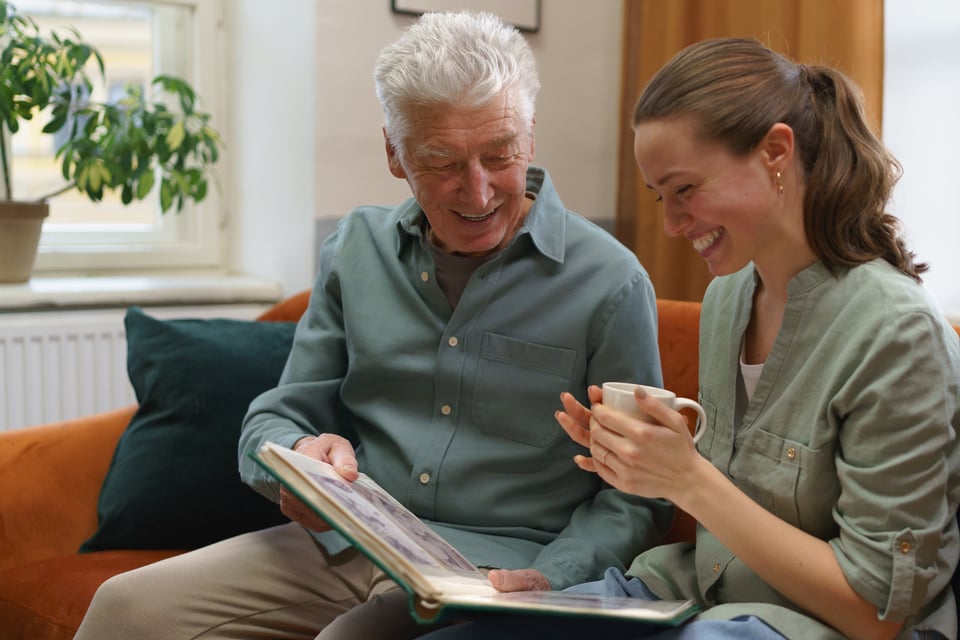Caregiving for someone you love, especially someone with a chronic or serious illness, is one of the most meaningful things you can do, but it also can pose challenges. You’re probably juggling medical appointments, medication schedules, and emotional ups and downs as you keep up with family, work, and everything else on your plate.
If you’re feeling stretched thin, you’re not alone, and assistance is available. A palliative care team can walk alongside you, providing help and relief through respite care, emotional support, education, and more.
What Is Palliative Care?
Palliative care teams work closely with providers to help individuals with advanced or life-limiting illnesses live more comfortably, with a focus on overall quality of life. With its holistic approach, palliative care addresses physical, spiritual, emotional, and social well-being. Unlike hospice services, palliative care is available to anyone in any stage of a serious or chronic illness, such as Alzheimer’s disease and other dementias, Parkinson’s disease, heart disease, neurological disorders, and cancer.
A multi-disciplinary team — including doctors, nurses, social workers, mental health professionals, and other specialists — will treat a variety of symptoms. Their goal is to help control and relieve side effects that often accompany serious or chronic illnesses. The team coordinates care among providers and tailors it to the needs of your loved one and your family. Through this coordination, palliative care improves the quality of services your loved one receives, enhancing a sense of purpose and meaning. Palliative care also can provide cost savings because some aspects of care usually are covered by insurance.
How Palliative Care Supports Caregivers
Palliative care recognizes the essential role you play in your loved one’s life and can improve your well-being by easing your day-to-day responsibilities and helping you feel confident and supported in your caregiving role.
Respite for Caregivers
When you dedicate time and energy to care for someone else, you may feel depleted to the extent that taking care of yourself can be difficult. Studies show that more than 60% of caregivers experience symptoms of burnout, such as emotional or physical exhaustion, feelings of helplessness, changes in sleep quality, and irritability.
One way palliative care supports caregivers is through respite care, which provides caregivers with scheduled time to recharge, helping prevent burnout and improving quality of life. Whether you use this time to rest, visit with friends, or engage in self-care, regular breaks allow you to maintain your health and well-being so you can effectively care for your loved one. According to one study, caregivers who use respite care experienced less worry, anger, and depression than caregivers who did not seek that service.
Emotional Support
For many, caregiving takes an emotional toll, especially if it involves a family member with a serious illness. Palliative care connects you with social workers and mental health professionals who can provide counseling and emotional support as you cope with stress and grief. Support groups also can provide a safe space to share your experiences in solidarity with others facing similar challenges. This emotional support can help you feel less isolated and better equipped to handle the highs and lows of caregiving.
Education and Training
In many cases, caregivers are family members with no health care experience. If this describes you, you may feel unqualified to help make decisions as your loved one’s condition changes. A palliative care team can equip you with strategies to manage your family member’s symptoms and administer treatments safely at home. They’ll also help you understand what to expect as your loved one’s illness changes, preparing you for each stage before it happens.
Symptom Management
Because palliative care teams specialize in improving quality of life by alleviating discomfort and managing symptoms, they work closely with you to recommend therapies, adjust medications, and manage symptoms, which can include pain, nausea, and anxiety. Not only can the team help ease your loved one’s day-to-day symptoms, but they also will work to mitigate your stress and worry.
Care Coordination
The health care system can be confusing to navigate. Palliative care teams keep everyone on the same page by coordinating between your loved one’s physicians and other care providers. They’ll also guide you through managing multiple treatment plans, if necessary.
A coordinated approach decreases the risk of redundant services, streamlines communication, and aligns your loved one’s care with their preferences. This eases the administrative burden from your shoulders so your day-to-day caregiving can feel more personal and less administrative. More efficient care can even help your loved one avoid hospitalization and lead to lower overall care costs.
How Palliative Care Improves Overall Quality of Life
You know how palliative care supports caregivers, but it also helps the rest of your family through holistic care, support, and guidance.
Palliative Care Supports the Patient
The goal of palliative care is to improve quality of life — easing pain and relieving symptoms so your family member can feel better and focus on relationships and activities of their choosing. The palliative care team also can help build your confidence about your caregiving abilities and stress the importance of taking time to recharge.
Palliative Care Supports the Whole Family
When someone in your family is experiencing a serious illness, interpersonal dynamics can become strained. Palliative care can create space for open, honest dialogue about care responsibilities. With a unified care plan that prevents tension and misunderstanding, families and other loved ones can feel supported and informed.
Assistance and Direction for Caregivers and Clients
To learn more about this type of care and service, read The Complete Guide to Palliative Care. As you navigate caregiving, The Complete Guide for Caregivers provides information and resources to guide you in caring for yourself as well as your family member.




